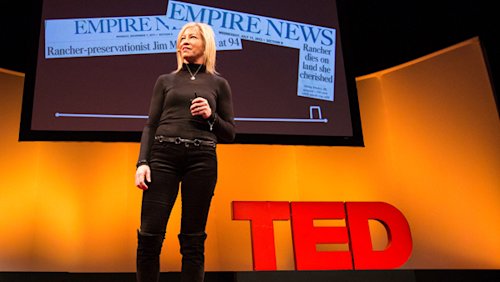Death is possibly the one remaining taboo for Western society. Golden Charter recently created an infographic that showed more than eight in 10 British people think their fellow citizens are uncomfortable mentioning the subject.
But more and more people are beginning to realise that talking about, and planning for, the end of their own lives can really make things easier for their loved ones when the time comes.
This growing trend for thinking about death and how it impacts us and those around us is covered in one of the most popular online lecture series, Ted Talks.
If you don't know TED, it's a non-profit organisation that started in the mid-80s as a conference covering technology, entertainment and design, but that has since grown to cover almost any subject imaginable... including death.
TED's mission is to build a global community of people that are seeking a 'deeper understanding of the world'. The organisation describes its website, TED.com, as a 'clearinghouse of free knowledge' featuring some of the world's most 'inspired thinkers', from Ruby Wax Stephen Hawking.
The site hosts more than 2,000 talks, video presentations lasting less than 20 minutes on topics ranging from bees to Buddhism, sanitation to social media.
The section dedicated to talks on death and dying, hosting 25 talks, is headed by a video playlist focusing on 'New ways to think about death'. In it, architect Alison Killing looks at buildings where death and dying happens, especially hospitals, and wonders if we've forgotten that it's possible, and maybe important to make them beautiful. BJ Miller is a palliative care physician who asks questions about what really matters at the end, how we think on death and honour life.
Other talks look at funeral rituals in Indonesia and environmentally funeral suits seeded with pollution busting mushrooms. Other 'talkers are anthropologists, artists, doctors, paramedics and philosophers.
One of the most powerful talks in the series is from Judy MacDonald Johnston, speaking about her personal experience of helping her elderly friends Jim and Shirley Modini prepare for a good end of life.
Judy says that thinking about death is frightening, but that planning ahead helps give peace of mind in our final days. In the talk she shares five practices for planning for a good end of life.
- Make a plan, which means "answering straightforward questions about the end you want"
- Recruit advocates who have "the time and proximity to do this job well"
- Prepare important documents such as a summary of your medical history
- Choose caregivers who fit your needs and desires
- Discuss last words: "What do you want to hear at the very end and from whom would you like to hear it?"
She finished by saying that she has learned that, "If we put some time into planning our end of life, we have the best chance of maintaining our quality of life".
The 25 talks in the 'Death' section of TED cover an amazingly wide range of issues, offering fresh perspectives on the one subject that touches us all. They clearly acknowledge that death isn't a pleasant thing to talk about, but all enthusiastically set out to help their audience face the subject more thoughtfully and with greater compassion.
Give them a watch and tell us which ones you find most interesting, moving or helpful.







